
My review of Part III of @SECNetwork series on Southern Hoops in the SEC, which aired Monday Feb. 13, 2023 covering the 1970s.
If you missed them, previous reviews of Part I (1930 to 1959):
and Part II (1960s):
Begin 🧵...
If you missed them, previous reviews of Part I (1930 to 1959):
https://twitter.com/bigbluehistory/status/1622108498971574274?s=20
and Part II (1960s):
https://twitter.com/bigbluehistory/status/1624860234614185984?s=20
Begin 🧵...

(1:20) Author Keith Dunnavant "C.M Newton was the head coach at Transylvania College, small college in Lexington. One day in 1968 ...he's interupted with a call from Paul Bryant...Bryant wants to talk to him about becoming the new head basketball coach at Alabama." 

Narrator: "Before calling C.M. Newton, Bear Bryant had called Adolph Rupp. One SEC giant asking another for a recommendation on a big hire. Rupp's answer?: C.M. Newton"
Dunnavant: "C.M. asked him 'Are there any restrictions on recruiting?' (black players) ... Bryant said no."
Dunnavant: "C.M. asked him 'Are there any restrictions on recruiting?' (black players) ... Bryant said no."

Newton had already been coaching black players at Transylvania. 1st was Robert Berry of Lexington Bryan Station HS, although it was interim coach Lee Rose who was there for signing in June 1965. Newton was away getting PhD from Alabama. 



Robert Berry was Transylvania's first black student-athlete at the school, but he was followed by others including Jim Hurley to play under Newton. 



(2:50) Re: Newton recruiting Wendell Hudson. Hudson played varsity for Alabama in 70-71 season. 1st black 🏀player in SEC was Perry Wallace at Vandy (67-68); 2nd was Henry Harris at Auburn (69-70). Others in 70-71 with Hudson were Ronnie Hogue at Georgia & Tom Payne at Kentucky. 






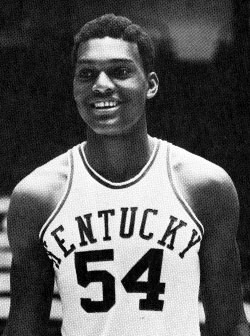
(3:45) Dunnavant: "Wendell became the player of the year in the SEC in 1973, on that breakout team for C.M. But from a cultural standpoint, Wendell became this transcendent figure, because he helped break down these barriers."
Wendell had huge games vs. Kentucky his Sr. year.



Wendell had huge games vs. Kentucky his Sr. year.




(29:30) Durand "Rudy" Macklin talks about choosing LSU. Macklin, of Louisville Shawnee, had come down to University of Louisville, University of Kentucky & LSU. He ended up joining another Ky native, Kenny Higgs of Owensboro Ky at LSU. 



(30:20) Dale Brown: "I told Rudy, you can go to Kentucky and Louisville. And they may win the national championship with you. But they also will win it without you."
Prophetic. Kentucky won the 1978 NCAA championship & Louisville won the 1980 NCAA championship.


Prophetic. Kentucky won the 1978 NCAA championship & Louisville won the 1980 NCAA championship.
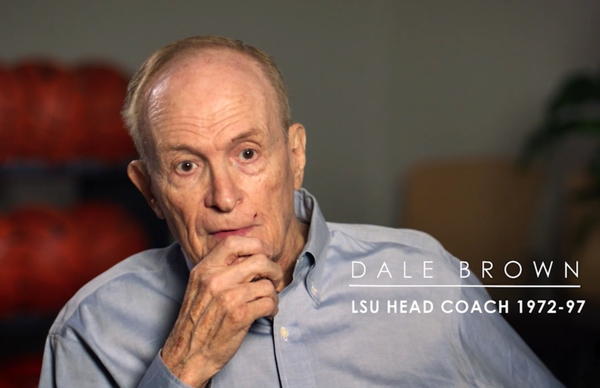


(38:10) Narrator: "The Baron of the Bluegrass won four National Championships, 27 regular season SEC titles and 876 games in his 41 years as Kentucky's head coach."
Again, to not even mention Rupp retired as all-time winningest coach in NCAA history at time is kind of rude.
Again, to not even mention Rupp retired as all-time winningest coach in NCAA history at time is kind of rude.
(38:30) Bolin: "His innovations and X's and O's were not so important, more important is he made basketball a big business."
Agree on big business part & true Rupp was more an adapter than innovator, but hard to overlook fact Rupp oversaw dramatic changes in🏀 over 4 decades.
Agree on big business part & true Rupp was more an adapter than innovator, but hard to overlook fact Rupp oversaw dramatic changes in🏀 over 4 decades.

(39:00) Kindred: "I've understood Rupp as a 19th century son of German immigrants in NE Kansas. I never once thought he should have been the MLK Jr. of college basketball. He was one of 1000s of coaches who never recruited black players."
Of course this is factually inaccurate.
Of course this is factually inaccurate.
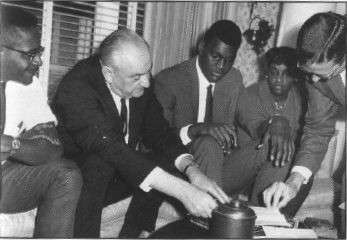
(38:22) Narrator: "There was also the stubborness & the spite, that didn't lend itself to warm treatment from the media as the years went by."
The producers then proceed to pile on about what a terrible person he was....
The producers then proceed to pile on about what a terrible person he was....
While there is some truth to it, including his battles with some in the media, I think it is worth mentioning that while Rupp often played the bad cop to Harry Lancaster's good cop to players, Rupp did have a soft heart at times when it really mattered...
For example in late 50's UK player Ed Beck lost his wife Billie Ray to cancer, and wrote a book about it "A Love to Live By". Rupp was extremely supportive of Beck & his dying wife during this trying time period, a side of Rupp most players never saw. 





Likewise Rupp was extremely affected by crippled children & worked for decades with the Shriners, giving his time & raising a lot of money to support them, including helping to build a hospital for them outside Lexington. 

(40:20) Conley: "There weren't a lot of people at his funeral, and it's in Lexington, beautiful church, there weren't a lot of people there."
Seems the implication is Rupp had burned his bridges, but if so that's again probably misleading...
Seems the implication is Rupp had burned his bridges, but if so that's again probably misleading...
The day prior, before a game against S. Car. there was a public remembrance of the Baron, along with his empty easy chair. It was said Rupp's fans, friends & former players had paid tribute throughout day at W.R. Milward Mortuary.
The Herald published a 12-page special section.
The Herald published a 12-page special section.

The funeral on a cold Dec Tuesday was reported to be his 'closest friends' although it was noted the first 6 rows of pews were filled with his former players, including Conley. Afterward a motorcade wound through Lexington to the cemetery, giving onlookers one last goodbye. 

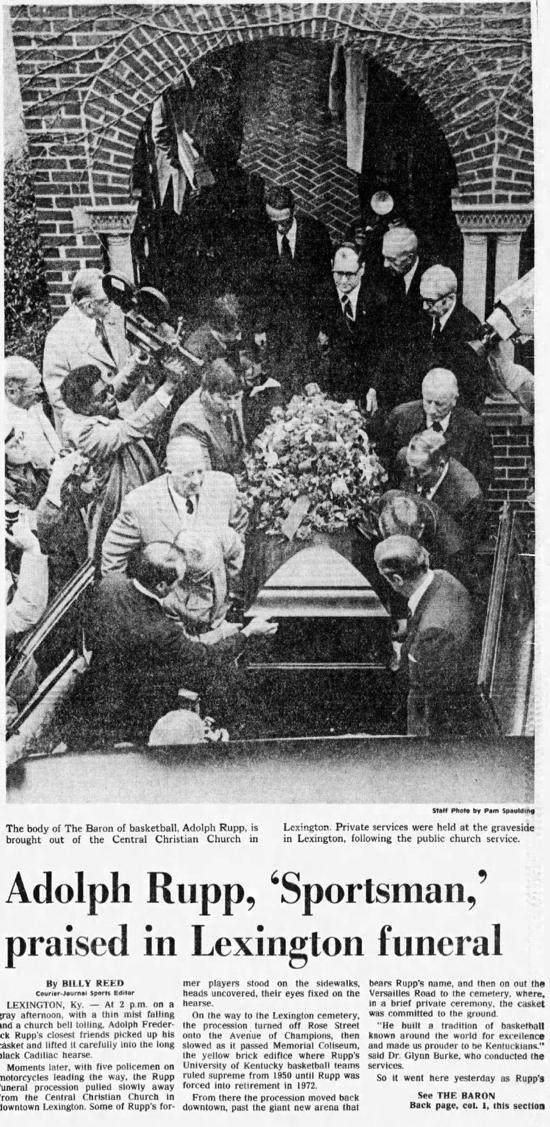

(40:55) Narrator: "To this day, he can be a divisive topic. His name atop Kentucky's arena still, a subject of protest".
Verdict? Overblown. Opposing fans bring up the name because they see it as a means to take shots UK, when they have very little else to hang onto. ...
Verdict? Overblown. Opposing fans bring up the name because they see it as a means to take shots UK, when they have very little else to hang onto. ...
Other critics have tried to bring up the issue from time to time, but they never rely on the facts. Instead they rely on innuendo & hearsay & never proven or long debunked rumors. They make efforts to avoid the facts because it undercuts their claims & reveals their hypocrisy...
The facts are Rupp of his own volition coached black players in the 1920s. He invited black teams to play in Lexington well before any other SEC school did, he was the 1st coach in SEC to recruit black players and he succeeded in integrating the Kentucky program.
To remove his name from a building based on innuendo & hearsay promoted largely by his critics over the years, while ignoring the actual facts is not only wrong, but it's demaning and disrespectful IMO to someone who simply doesn't deserve being made a scapegoat. 

(41:30) K. Walker: "I don't think that he was a racist. But, did he maybe say a word or something...I think we probably all have. Again, he's not here to defend himself about all of that, but I think the name should stay....because it's gonna tell the history." 
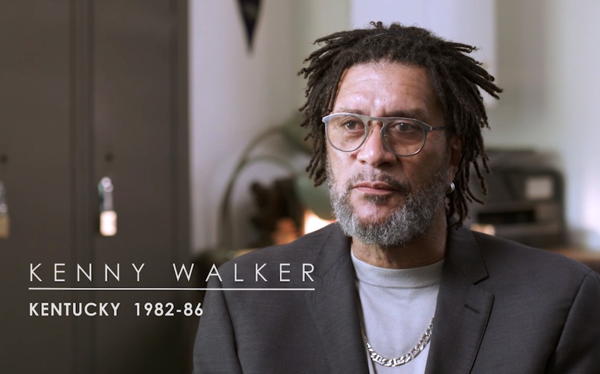
(42:10) Jack Givens: "He [Rupp] called me into his office as I was walking by. I said 'Hey coach how are you?' He said I'm fine. He said 'I just want you to know one thing: I'm glad you're here.' I had no doubt he was 100% serious about that. He said I'm really glad you're here." 

(44:25) Givens: "There were both sides who had mixed emotions ..... The relationship between the University & the African American community was still not a very good one. There were African American people who were saying the same thing not wanting us to go to UK."
This is a point that is rarely acknowledged or discussed. I've alluded to this before but many of Rupp's critics either didn't or if they weren't there at time wouldn't have helped UK become integrated. Instead they tried to dissuade players away from UK, for various reasons.
In fact there's many examples of black players who were dissuaded by some in the black community from attending UK in the 1960s under Rupp. And that attitude continued for decades afterwards, long after Rupp was gone. Largely based on unsubstantiated rumors & bogus claims.
I personally respect those in the black community who encouraged black students & athletes to attend UK & made an effort to advance progress. Those who stood in the way, I don't have a lot of respect for frankly. And that includes some people today who want to hold onto grudges.
(49:20) Givens: "At the end of the [1978 NCAA Championship] game, James Lee dunks that ball. That was the best way that game cold have ended."
Agree. Well deserved ending for both Jack Givens & James Lee, two Lexington heroes.
Agree. Well deserved ending for both Jack Givens & James Lee, two Lexington heroes.

Nice ending to the decade of the 70's, with Kentucky back on top of the college basketball world.
Maybe should have mentioned UK beat Arkansas & Eddie Sutton with Triplets in Final Four on way to Championship game vs. Duke, though?



Maybe should have mentioned UK beat Arkansas & Eddie Sutton with Triplets in Final Four on way to Championship game vs. Duke, though?


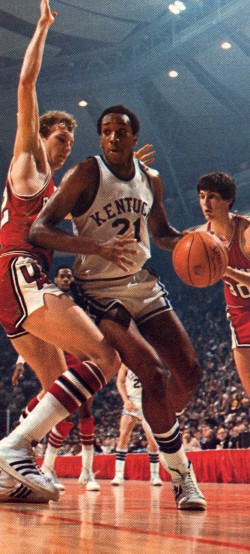

Many unmentioned: UA's Reggie King & Robert Scott; UT's Reggie Johnson & Howard Wood; AU's Eddie Johnson & Mike Mitchell; UF's Chip Williams; LSU's Al Sanders & Kenny Higgs; Ole Miss' Johnny Neumann & John Stroud; MSU's Jerry Jenkins, Vandy's Jan Van Breda Kolff & Charles Davis 







Overall episode was better. It wasn't as rushed as 1st episode & not as insular & 1-dimensional as 2nd. Still got overly preachy at the end, continuing to pile on Rupp which I think is unfair.
Still think better giving the women's teams own series.
End 🧵 @threadreaderapp unroll
Still think better giving the women's teams own series.
End 🧵 @threadreaderapp unroll
• • •
Missing some Tweet in this thread? You can try to
force a refresh

























